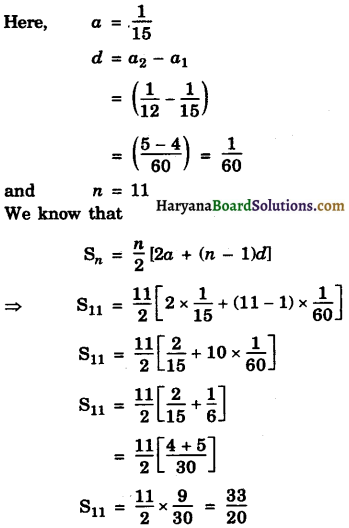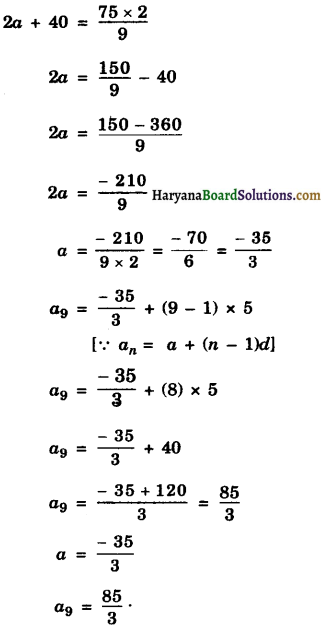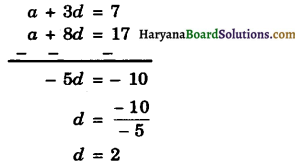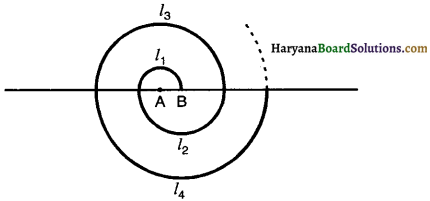HBSE 6th Class English Solutions Honeysuckle Chapter 7 Fair Play
Haryana State Board HBSE 6th Class English Solutions Honeysuckle Chapter 7 Fair Play Textbook Exercise Questions and Answers.
Haryana Board 6th Class English Solutions Honeysuckle Chapter 7 Fair Play
HBSE 6th Class English Fair Play Textbook Questions and Answers
A. Match sentences under I with those under II.
I
1. Jumman and Algu were the best of friends.
2. Jumman’s aunt transferred her property to him.
3. The aunt decided to appeal to the Panchayat.
4. Algu was unwilling to support the aunt.
5. Jumman was very happy to hear Algu’s name as head Panch.
II
1. She wanted justice.
2. He believed that his friend would never go against him.
3. In the absence of one, the other took care of his family.
4. The condition was that he would be responsible for her welfare.
5. The bond of friendship between him and Jumman was very strong.
Answer:
| I | II |
| • Jumman and Algu were the best of friends. | • In the absence of one, the other took care of his family. |
| • Jumman’s aunt transferred her property to him. | • The condition was that he would be responsible for her welfare. |
| • The aunt decided to appeal to the Panchayat. | • She wanted justice. |
| • Algu was unwilling to support the aunt. | • The bond of friendship between . him and Jumman was very strong. |
| • Jumman was very happy to hear Algu’s name as head Ranch | • He believed that his friendship would never go against him |
![]()
B. Answer the following questions:
Fair Play 6th Class English HBSE Honeysuckle Question and Answer Question 1.
My wife knows best how to run the house.
Answer:
Jumman says this to his aunt as she wants to get a monthly allowance from him.
6th Class English HBSE Honeysuckle Question and Answer Fair Play Question 2.
But is it right, my son, to keep mum and not say what you consider just and fair?
Answer:
Aunt says this to Algu as she wants to make him realise his duty as a just human being.
Fair Play Question and Answer 6th Class English HBSE Question 3.
What have you to say in your defence?
Answer:
Algu says this to Jumman as he wants to hear his defence as a Punch.
Question 4.
I can’t pay you a penny for the wretched beast you sold me.
Answer:
Sahu says this to Algu as he does not want to pay the money to him (Algu) after the bullock’s death.
Question 5.
Victory to the Panchayat. This is justice.
Answer:
Algu says this to Jumman and others as Jumman delivers judgement quite impartially.
C. Answer the following questions:
Question 1.
‘Then the situation changed’. What is being referred to?
Answer:
When some property was transferred to Jumman, he and his family were tired of Aunt after a couple of years. This situation is being referred to here.
Question 2.
When Jumman’s aunt realised that she was not welcome in his house, what arrangement did she suggest?
Answer:
She suggested that she should be given monthly allowance.
Question 3.
What was the villager’s reaction when the aunt explained her case to them?
Answer:
The villagers reacted in various manners. Some sympathised with her, some laughed at her while some advised her to settle the dispute with Jumman and his wife.
![]()
Question 4.
Why was Jumman happy over. Algu’s nomination as head-panch?
Answer:
Jumman was happy over Algu’s nomination as head panch because Algu was his best friend.
Question 5.
‘God lives in the heart of the Panch’, the aunt said. What did she mean?
Answer:
She meant that a Panch has to be just and impartial just like God.
Question 6.
What was Algu’s verdict as head- panch? How did Jumman take it?
Answer:
Algu gave this verdict that Jumman must either pay his aunt a monthly allowance or he must return the property to her.
Question 7.
Algu found himself in ‘a tight spot’. What was his problem?
Answer:
Algu’s one fine bullock died and he sold the other to Samjhu Sahu a cart driver of the village. The bullock died within a month. So Sahu did not want to pay the price of the bullock.
Question 8.
Why was Algu upset over Jumman’s nomination as a head-panch?
Answer:
Algu was upset over Jumman’s nomination as a head-panch because he thought now Jumman would take revenge on him.
Question 9.
What was Jumman’s verdict as head Panch? How did Algu take it?
Answer:
Jumman’s verdict as head-Panch was that Sahu should pay Algu, the price of the bullock. Algu was overjoyed and said loudly “Victory to the Panchayat….”
Question 10.
Which of the following sums up the story best?
(a) I also “know that you will not kill your conscience for the sake of friendship.”
(b) “Let no one deviate from the path of justice and truth for friendship or enmity.”
(c) “The voice of the panch is the voice of God.”
Give a reason for your choice.
Answer:
(c) The voice of the Panch is the voice of God because God is supposed to be just and impartial. In this story Jumman and Algu gave their verdict as a Panch like God being just and impartial.
![]()
HBSE 6th Class English Fair Play Important Questions and Answers
Question 1.
What was the fault of Jumman’s aunt?
Answer:
Jumman’s aunt was an old lady. She had some property. She transferred her property to Jumman. This was her biggest fault.
Question 2.
How long did Jumman and his wife look after the old aunt? What happened afterwards?
Answer:
Jumman and his wife looked after the old aunt for two years. Then Jumman and his wife got tired of the old woman. Both of them became indifferent to her. They got sick of feeding her. They also started insulting her.
Question 3.
What made the aunt very angry?
Answer:
The aunt asked Jumman to give her a monthly allowance. She said that she would set up a separate kitchen. Jumman got annoyed with her. He spoke shamelessly that his wife knew better how to run the house. He snubbed her and asked her to have patience. This incident made the aunt very angry.
Question 4.
‘Her words kept ringing in his ears’. Explain.
Answer:
Jumman’s aunt explained her case to Algu and asked him for help. Algu showed his helplessness as he was Jumman’s friend. The aunt asked Algu if it was right to keep mum and not speak what is just and fair. She also asked Algu to come to the panchayat and speak the truth. These words of Jumman’s aunt kept ringing in Algu’s ears.
Question 5.
Why was the Panchayat held under an old banyan tree both the times?
Answer:
Perhaps there was no panchayat ghar in the village. There is party politics in every village. Therefore, it is not proper to hold the panchayat in anybody’s personal house. Therefore, it was held in the common place ‘an old banyan tree’.
![]()
Question 6.
What is the importance of breach of understanding in this lesson?
Answer:
Jumman had given the understanding that he would keep his aunt in his house and look after her. He became indifferent to his aunt.
Samjhu Sahu had given the understanding to Algu to make payment for the bull in a month. He refused to make the payment because the bullock died within the month.
Both the cases brought before the panchayat related to ‘breach of understanding’.
Question 7.
How long did Jumman and his wife look after the old aunt? What happened afterwards?
Answer:
Jumman and his wife looked after the old aunt for two years. Then Jumman and his wife got tired of the old woman. Both of them became indifferent to her. They got sick of feeding her. They also started insulting her.
Question 8.
What made the aunt very angry?
Answer:
The aunt asked Jumman to give her a monthly allowance. She said that she would set¬up a separate kitchen. Jumman got annoyed with her. He spoke shamelessly that his wife knew better how to run the house. He snubbed her and asked her to have patience. This incident made the aunt very angry.
Question 9.
‘Her words kept ringing in his ears’. Explain.
Answer:
Jumman’s aunt explained her case to Algu and asked him for help. Algu showed his helplessness as he was Jumman’s friend.
The aunt asked Algu if it was right to keep mum and not speak what is just and fair. She also asked Algu to come to the panchayat and speak the truth. These words of Jumman’s aunt kept ringing in Algu’s ears.
Question 10.
Why was the panchayat held under an old hanyan tree both the times?
Answer:
Perhaps there was no panchayat ghar in the village. There is party politics in every village. Therefore, it is not proper to hold the panchayat in anybody’s personal house. Therefore, it was held in the common place ‘an old banyan tree’.
![]()
Question 11.
What is the importance of breach of understanding in this lesson?
Answer:
Jumman had given the understanding that he would keep his aunt in his house and look after her. He became indifferent to his aunt.
Samjhu Sahu had given the understanding to Algu to make payment for the bull in a month. He refused to make the payment because the bullock died within the month.
Both the cases brought before the panchayat . related to breach of understanding.
Question 12.
If you would have been nominated as head Panch in either of the cases; what judgement would you have given?
Answer:
If I would have been nominated as head Panch in either of the cases, I would have also given the same judgements as that were the most unbiased and just verdict.
Fair Play Passages for Comprehension
Passage – 1
Jumman ……………… its limits.
Questions :
(i) What did Jurnrnan’s aunt transfer to him?
(ii) What was the understanding between them?
(iii) How long did the arrangement work well?
(iv) Who swallowed the insults and how long?
(v) Use the phrase ‘to look after’ in your own sentence.
Answers:
(i) Jumman’s aunt transferred to him the little property she had.
(ii) The understanding was that the aunt would stay with Jumman and he would look after her.
(iii) The arrangement worked well for two years.
(iv) Jumman’s aunt swallowed the insults for a few months.
(v) Parents have to look after their children.
Passage – 2
For many ……………… in his ears.
Questions:
(i) Who is the old lady here?
(ii) What was her case?
(iii) Why did she explain her case to the villagers?
(iv) How could Algu not go against Jumman?
(v) Use the phrase ‘to laugh at’ in your own sentence.
Answers :
(i) Jumman’s aunt is the old lady here.
(ii) The refusal of Jumman to pay his aunt a monthly allowance to set up a separate kitchen was her case.
(iii) She explained her case to the villagers to seek their support.
(iv) Algu could not go against Jumman because they were fast friends.
(v) Do not laugh at the poor and helpless people.
Passage – 3
“Jumman.” said …………… to say.”
Questions :
(i) What is Algu’s role here?
(ii) Who were old friends?
(iii) What could Jumman not stop?
(iv) What was not possible for Jumman?
(v) Use the phrase ‘as dear as’ in your own sentence.
Answers:
(i) Algu is the head Panch here.
(ii) Jumman and Algu were old friends.
(iii) Jumman could not stop the quarrels between his wife and his aunt.
(iv) It was not possible for Jumman to pay a monthly allowance for his aunt.
(v) A daughter is as dear as a son for the parents.
![]()
Passage – 4
Days passed you sold me.
Questions :
(i) What happened to one of Algu’s bullocks?
(ii) What did he do to the other bullock?
(iii) Who was Samjhu Sahu?
(iv) What was the understanding between Sahu and Algu Chowdhry?
(v) What does the wretched beast here refer to?
Answers :
(i) One ofAlgu’s bullocks died.
(ii) He sold the other bullock to Samjhu Sahu.
(iii) Samjhu Sahu was the cart driver of the village.
(iv) The understanding was that Sahu would pay the price of bullock to Algu in a month’s time.
(v) ‘The wretched beast’ here refers to the bullock which Algu had sold to Samjhu.
![]()
Passage – 5
Both Algu …………….. Panch.”
Questions :
(i) What role is Jumman playing here?
(ii) What was Jumman’s announcement?
(iii) Did the bullock suffer any disability or disease when it was bought?
(iv) How could Algu not be blamed?
(v) ‘Unfortunate’ has ‘un’ as prefix. Writetwo other words with ‘un’ as prefix.
Answers :
(i) Jumman is playing the role of the head Panch here.
(ii) Jumman’s announcement was that Sahu should pay Algu the price of the bullock.
(iii) No, the bullock did not suffer any disability or disease when it was bought.
(iv) Algu could not be blamed because the bullock’s death was unfortunate.
(v) Unable, unlucky.
Fair Play Translation in Hindi
Part – I
1. Jumman Shaikh …………… village
जुमन शेख और अलगू चौधरी अच्छे मित्र थे। उनकी मित्रता का बंधन इतना मजबूत था कि जब दोनों में से कोई एक गाँव से दूर जाता तो दूसरा उसके परिवार की देखभाल करता था। दोनों का
Word-Meanings:
Bond-relation, Halli Looked after-took care of, देखभाल करता था।
2. Jumman had ……………. its limits.
3. One day …………… kitchen.”
“My wife knows …………… panchayat.
जुमन की एक बूढ़ी चाची थी जिसके पास कुछ संपत्ति थी। इसे उसने इस समझौते के साथ उसे हस्तांतरित कर दी कि वह उसके साथ रहेगा और वह उसकी देखभाल करेगा। कुछ वर्षों तक यह व्यवस्था ठीक तरीके से चलती रही। फिर स्थिति बदल गई। जुमन और उसका परिवार बूढी संबंधी से थक गये। जुमन की पत्नी जो कि थोड़ा-सा भोजन इस औरत को प्रतिदिन दिया करती थी, प्रतिकार करती थी, तथा दोनों उसकी तरफ से उदासीन हो गये। वह (चाची) कुछ महीनों तक भोजन के साथ बेइज्जती सह लेती थी। लेकिन धीरज की सीमा होती है।
एक दिन उसने जुमन से कहा, “मेरे पुत्र, अब यह साफ है कि मैं तुम्हारे घर में चाही नहीं जा रही हूँ। कृपया मुझे मासिक भत्ता दे दिया करो ताकि मैं अलग रसोई कायम कर सकूँ।
“मेरी पत्नी जानती है कि घर किस प्रकार से अच्छे तरीके से चलाया जाता है। धीरज रखो।” जुमन ने बेशर्मी से कहा। इस बात ने चाची को बहुत क्रोधित कर दिया और उसने इस मामले को गाँव की पंचायत के पास ले जाने का निश्चय किया।
Word-Meanings:
Understanding thinking, समझा Couple-pair,जोड़ा (यहाँ पर)। Indifferent-unconcerned, greitai Grudged gave unwillinglly, envied, felt unhappy, असंतोष प्रकट किया। Swallowed-tolerated, निगल लिया। Obvious-clear, Hel Shamelessly-without any sense of shame, निर्लज्जता से।
![]()
4. For many …………… in his ears.
कई दिनों तक, बूढ़ी औरत गाँववालों को अपना मामला स्पष्ट करते हुए और उनका समर्थन पाने के लिए बात करती हुई देखी गई। कुछ गाँववालों ने उसे सहानुभूति दिखाई, कुछ उस पर हँसे और कुछ अन्यों ने उसके भतीजे और उसकी पत्नी से सुलह करने की सलाह दी। अंत में वह अलगू चौधरी के पास आई और उससे बातें कीं! “तुम जानती हो, चाची, जुमन मेरा सबसे बढ़िया मित्र है। मैं उसके विरूद्ध कैसे जा सकता हूँ?” अलगू ने कहा, “लेकिन क्या यही सही है, मेरे बेटे, कि तुम चुप्पी रखो और जिसे तुम ठीक और न्यायसंगत समझते हो उसे नहीं कहो।” बूढ़ी औरत ने दलील दी। “पंचायत में आओ और सच बोलो,” उसने कहा। अलगू ने कोई जवाब नहीं दिया लेकिन उसके शब्द उसके कान में गूंजते रहे।
Word-Meaning:
Mum-quiet, silent, चुप्पी। Ringing-बजते रहे।
PART – II
5. The …………… her decision.
6. The Panch…………… of luck.
उसी शाम एक बरगद के नीचे पंचायत लगाई गई। जुमन खड़ा हुआ और बोला, ‘पंच की आवाज भगवान की आवाज होती है। मेरी चाची को मुख्य पंच को मनोनीत करने दें। मैं उनके निर्णय को मानूंगा।”
पंच न मित्र और नहीं दुश्मन जानता है। तुम अलगू चौधरी के बारे में क्या कहते हो।” बूढ़ी औरत ने घोषणा की।
“ठीक है” जुमन ने अप्रत्याशित भाग्य पर खुशी छिपाते हुए कहा।
Word-Meanings:
Nominate-suggest somebody’s name, मनोनीत करती है। Abide-accept, obey, मानना। Unexpected-not precalculated, अप्रत्याशित।
“Chachi, you …………… her case.
“चाची, तुम तो जुमन के साथ मेरी दोस्ती को जानती हो,” अलगू ने कहा “मैं इसे जानती हूँ” चाची ने कहा, लेकिन मैं यह भी जानती हूँ कि तुम दोस्ती के वास्ते अपनी आत्मा को नहीं मारोगे। भगवान् पंच के हृदय में रहता है और उसकी आवाज भगवान की आवाज होती है।” और उस बूढ़ी औरत ने अपने मामले का खुलासा किया।
Word-meaning:
Conscience-inner soul, अंतरात्मा। Friendship-amity, मित्रता। Kill-to cause death, मारना।
“Jumman,” said …………… defence.?”
“जमुन’ अलगू ने कहा, “तुम और मैं पुराने दोस्त हैं, तुम्हारी चाची मेरे लिये उतनी ही प्रिय है, जितने कि तुम हो। अब मैं पंच हूँ। तुम और चाची मेरे लिए समान हो। तुम्हें अपने बचाव में क्या
कहना है।”
Word-Meanings:
Defence-safety, protection बचाव।
![]()
“Three years …………… to say.”
“तीन साल पहले” जुमन ने जारी रखा, “मेरी चाची ने अपनी संपत्ति मुझ को हस्तांतरित कर दी। मैंने जब तक चाची जिंदा रहती है, उसे साथ देने का वायदा किया था। मैं जो कुछ कर सकता था, किया। मेरी पत्नी और चाची के बीच कई झगड़े हुए हैं लेकिन इन्हें मैं नहीं रोक सकता हूँ। अब मेरी चाची मुझसे मासिक भत्ते का दावा कर रही है। यह संभव नहीं है। यही सब कुछ मुझे कहना है।”
Word-Meanings:
Property-belongings, what is owned, संपत्ति। Quarrels-disputes, झगड़े। Allowance-some money for livelihood, भत्ता।
7. Jumman was …………… to her.”
जुमन से अलगू और अन्य पंचों के द्वारा जिरह की गई। अब अलगू ने घोषणा की, ‘हमने मामले की सावधानीपूर्वक खोजबीन की है। हमारे विचार में जुमन को अपनी चाची को मासिक भत्ता देना चाहिए या फिर संपत्ति उसे वापस लौटानी होगी।’
Word-Meaning:
Cross-examineddebated, जिरह की।
8. Now, the two…………… his revenge.
अब दोनों मित्रों को कभी-कभार ही साथ देखा जाता था। दोनों के बीच टुट गई। वास्तव में जुमन अलगू का दुश्मन हो गया और उससे बदला लेना चाहता था।
Word-Meanings:
Seldom-not frequently, कभी-कभार ही। Revenge tit for tat, बदला।
Part – III
9. Days passed …………… a month.
दिन बतीते गये और जैसा कि दुर्भाग्य में था, अलगू चौधरी एक मुसीबत में फंस गया। उसके अच्छे बैलों की जोड़ी में से एक बैल मर गया और उसने दूसरे बैल को समझू साहू जो कि गाँव में ही गाड़ी चालक था, को बेच दिया। समझौता यह थी कि साहू एक महीने के वक्त में बैल की कीमत चुका देगा। यह ऐसा हुआ कि बैल एक महीने के दौरान ही मर गया।
Word-Meanings:
Tight spot-difficult situation, परेशानी में। Happened-took place, घटित हुआ।
10. Several …………… said angrily.
बैल की मौत के कुछ महीनों बाद, अलगू ने समझू को जो अभी तक पैसा नहीं चुकाया था, के बारे में याद दिलाया। साहू बहुत चिड़ गया “मैं उस दुष्ट बैल के लिए जिसे तुमने मुझे बेचा था एक कौड़ी भी नहीं चुका सकता। वह बैल बर्बादी के अलावा हमारे लिए कुछ नहीं लाया। मेरे पास एक बैल है। (तुम) एक महीने के लिए प्रयोग करो और तब मुझे वापस लौटा दो। मरे हुए बैल के लिए कोई पैसा-धेला नहीं,” उसने गुस्से में कहा।
Word-Meaning:
Bullock-ox, बैल। Annoyed-irritated, चिढ़ गया। Wretchedmiserable, worthless, दुष्ट।
11. Algu decided …………… support.
अलगू ने मामले को पंचायत ले जाने का निश्चय किया। कुछ दोनों ही पार्टियाँ उनके समर्थन पाने के लिए लोगों से मिलने का काम शुरू कर दिया।
Word-Meanings:
Refer-submit, सौंपना, विचारार्थ भेजना। Seeking-asking earnestly for, माँगते हुए। Support-to uphold, समर्थन।
12. The panchayat……………decision.”
पुराने बरगद के पेड़ के नीचे पंचायत रखी गई। अलगू खड़ा हुआ और बोला, “पंच की आवाज भगवान की आवाज होती है। साहू को मुख्य पंच नामांकित करने दें मैं उसका निर्णय मानूँगा।”
13. Satusaw …………… could he do?
साहू ने अपना अवसर देखा और जुमन का नाम प्रस्तावित कर दिया। अलगू का दिल बैठ सा गया और वह पीला पड़ गया। लेकिन वह कर क्या सकता था?
Word-Meanings:
Proposed-suggested, प्रस्तावित किया। Sank-fell down in spirit, (दिल) बैठ गया, डूब गया। Pale-wan, lost colour, पीला।
14.The moment……………doingjustice.
जिस क्षण जुमन मुख्य पंच बना, उसने जज के रूप में जिम्मेदारियाँ और ओहदे की महत्ता महसूस की। क्या वह, उस ऊँचे स्थान पर बैठकर, अब बदला ले सकता था? वह सोचता ही रह गया। नहीं, उसे सत्य बोलने की राह में तथा न्याय करने के लिए अपनी व्यक्तिगत भावनाओं को आगे नहीं आने देनी चाहिए।
Word-Meanings:
Dignity-reputation, महत्ता Justice-fair treatment, न्याय।
![]()
15. BothAlgu …………… Panch.”
अलगू और साहू दोनों ने अपने मामले बयान किये। उनकी दोनों तरफ से जिरह की गई और मसले को गहराई से सोचा गया। तब जमुन खड़ा हुआ और घोषणा की, “यह हमारा विचार है कि साहू को बैल की कीमत चुकानी चाहिए। जब साहू ने बैल खरीदा था तब यह किसी अयोग्यता या बीमारी से पीड़ित नहीं था। बैली मौत दुर्भाग्यपूर्ण थी परंतु इसके लिए अलगू को दोष नहीं दिया जा सकता है।” अलगू अपनी भावनाओं को काबू में नहीं रख सका। वह खड़ा हो गया और बार-बार जोर से बोला, “पंचायत की जय हो। यह न्याय है। पंच की वाणी में भगवान् रहते हैं।”
Word-Meanings:
Stated-narrated, cited, कहा। Opinion-view, विचार। Contain-keep under control, रखना। Victory-triumph, upperhand, विजय।
16. Soon after …………… or enmity.”
शीघ्र ही बाद में जुमन अलगू के पास आया, उसे गले लगाया और बोला, “पिछली पंचायत से, मैं तुम्हारा दुश्मन हो गया था। आज मैंने महसूस किया कि पंच होना क्या होता है। पंच का कोई मित्र या दुश्मन नहीं होता। वह केवल न्याय जानता है। किसी को भी मित्रता या दुश्मनी के लिए न्याय और सत्य के मार्ग से विचलित नहीं होना चाहिए।”
Word-Meanings:
Embraced-hugged, गले लगाया। Deviate-to move away from, रास्ता भटकना। Enmity-hostility, दुश्मनी।
Algu embraced ………… between them.
अलगू ने अपने मित्र को गले लगा लिया और रो पड़ा। और उसके आँसुओं ने उनके बीच की गलतफहमी के कचरे को बहा दिया।
Word-Meanings:
Misunderstandingwrong calculation, गलतफहमी Became indifferent-lost interest in, did not care for, उदासीन बन गया। Grudged-gave unwillingly, अनिच्छा से दिया। Swallowed-tolerated, सह गया। Make it up-come to agreement, समझौते करना। Mum-quiet/ silent, चुप्पी। Nominate-to propose somebody’s name,मनोनीत करना। Abide by-accept, पालना करना। Seldom-rarely, कदाचित ही।
Fair Play Summary in English
Munshi Premchand has narrated the story of two friends Jumman Shaikh and Algu Choudhry. Jumman got some property from his aunt on the understanding that she would stay with him and he would look after her. When this understanding is violated, she approaches the village panchayat. Algu is made the head Panch. He gives the verdict in favour of aunt. Consequently, a friend turns a foe. Ther Jumman also gets a chance to settle the score, when he is made a head Panch by Sahu who does not want to pay the remaining money of a bullock sold to him by Algu. But when Jumman really becomes a head panch, he becomes impartial. He gives the verdict in favour of Algu. Thus justice triumphs.
Fair Play Summary in Hindi
मुंशी प्रेमचंद ने दो मित्र जुमन शेख और अलगू चौधरी की कहानी बताई है। जुमन को अपनी चाची से कुछ संपत्ति इस समझौते से प्राप्त हुई कि वह उनके साथ रहेगी और वह उसकी देखभाल करेगा। जब इस आपसी समझौते का उल्लंघन हुआ तो चाची गाँव की पंचायत के पास पहुँचती है। अलगू को मुख्य पंच बनाया जाता है वह चाची के पक्ष में फैसला दे देता है। परिणामस्वरूप मौका मिलता है जब साहू के द्वारा उसे मुख्य पंच बनाया जाता है। साहू अलगू द्वारा उसको बेचे गए बैल की कीमत के बाकी बचे हुए पैसे नहीं चुकाना चाहता है। किंतु जब जुमन वास्तव में मुख्य पंच बनता है तब वह निष्पक्ष हो जाता है। वह अलगू के पक्ष में फैसला देता है। इस प्रकार न्याय की विजय होती है।
HBSE 6th Class English Solutions Honeysuckle Chapter 7 Fair Play Read More »






